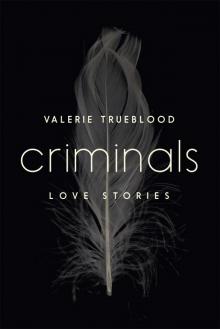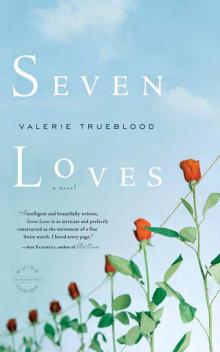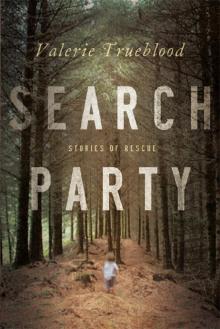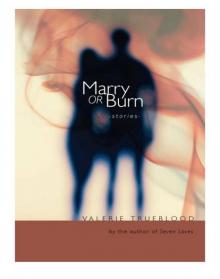- Home
- Valerie Trueblood
Search Party Page 5
Search Party Read online
Page 5
“I know that. That’s why I’m talking to her. I’m making a good impression.”
“This is my big brother, Sam,” Casey said, flashing her red eyes. “Come in here, I’ll show you Randy and Rocky’s room,” she went on, taking Ann’s free hand and pulling her. By the laden table Ann pulled up short and set down her cup to refill it. She had come, she had done her duty, but she had to protect herself. Casey kept hold of Ann’s hand and held her own cup out to be filled too. “You haven’t actually met Mom,” she said. “This is my boss, Ann,” she called to her mother across the table, waving Ann’s hand at her. Her mother was talking to several people sitting up close to her chair or bending around her, but at the sound of her daughter’s voice she looked up and smiled, wreathing her forehead with the smoke she was blowing straight upward into her own nose, away from the faces of her listeners.
“How do you do?” she said. Behind her frames her eyes were the same blue as Casey’s, though their red seemed more like that of normal weeping.
“I’m so sorry,” Ann crooned to her across the laurel leaves. “I’m just . . . I’m so sorry.”
“Oh,” said Casey’s mother, waving her fingers through the smoke, “we all are. Did you know Randy?” It rushed into Ann’s mind that it was Vincent Price. The llamas. Their expression. Vincent Price.
“No, but I feel as if I did. I’ve heard so much about him from Casey.”
“Randy,” said the mother. “Randy was the one.”
“He was,” the group around her said in unison.
“Donna, you get Ann something to eat,” the mother said, and a blonder version of Casey stood up and began forking sliced meats onto a plate. “Kendra honey, would you just get me a little more coffee. Right there, the decaf. That’s something you could do for me. Donna, you don’t need to make her sick.”
“I get to decide,” Donna said, winking at Ann and kissing the top of her mother’s head. She added baby carrots and cherry tomatoes and leaned her big breasts across the table to hand the plate to Ann. She fluffed out one of the little napkins and handed that over too.
“Oh, thank you,” Ann said, immediately starting to eat. She wiped her mouth. Her impulse was to go around and seize the winking, sensible, food-providing Donna with a hug of sympathy, but Donna had already sat down again beside her mother.
“Come,” Casey said. She was leading Ann by the edge of her full plate. “You need anything else?”
“No,” said Ann, eating as she followed, popping a log of rolled-up ham into her mouth and glancing up insolently at the firemen they were bumping into. They had to let her pass, with Casey in the lead. She sank against the doorframe, once they were in Randy’s room. But of course it wasn’t only Randy’s; there were twin beds in the dim, close room. The other brother, Rocky, was in the service. He had been at the bedside as much as he could be, but then he had been flown somewhere he couldn’t get back from in time for the funeral. “He’ll never get over it,” Casey said. “Not being here.” He was stationed at McChord getting his training in something to do with cargo aircraft. Something Casey kept saying the name of, day after day.
Todd would say she had let herself be lured into this room where Casey had the advantage and would talk her ear off and somehow get something out of her that she would be responsible for remembering when they got to work on Monday. Not only that, she had drunk too much, too fast, and she wasn’t used to it because of her regimen of abstaining except on weekends. She wobbled off the door. Her limbs were heavy. “Oh Casey. I ate too fast and I’ve had too much to drink.” Now she’d done it. This would be something they had between them, on Monday.
“So?” Casey said.
“I think I should just go outside. The cold air’s good.”
“Go ahead,” Casey said, sitting down on the bed.
“Are you all right?”
“I’ll never be all right,” Casey said, swilling her own wine. “But I think of all the people who’ve had someone die.”
“That’s true,” Ann said, letting her eyes fall shut.
“My father died, but I was too young. I didn’t have to really go through that. The older ones did. Mom did.”
“My father died,” Ann said in self-defense, looking into the dark red-brown of her own lids until that too began to swarm and she had to open her eyes. That was better.
“I know,” Casey said. “I know that.” Ann could remember getting up abruptly and leaving for the ladies room, after Casey had somehow tapped into the story of her father, at the office. “You were ten, I was six,” Casey said. “I wasn’t the youngest, Donna was. Well. What can you do.” She lay back on the bed with the cup in her hand. “Oops, spilled. I hoped you’d come today. And Jesus told me that you would.”
Ann had stayed close to the door, but she couldn’t turn tail and make her way to the sanctuary of the little bathroom, leaving Casey lying there. She said, “Your brother. Tell me about him.”
“Nothing to tell,” said Casey. But she drew a long sobbing breath of preparation.
“Oh,” Ann said. “I don’t feel well. I’m sorry.”
“You could lie down,” said Casey, without moving.
“I think I need to get outdoors into the air. I’ll just be a minute.” The crowd from the dining room had filled the hall, so that she would have to push even to get out of the room. “Uh-oh,” she said. “Do you have—is there a wastebasket?”
“Here, just hang your head out,” Casey said, rolling off the bed and yanking the window open. Ann got there and fell to her knees, thrust her head out into the cold air and let it hang down over the cracked, mossy sill. “Or, you can climb all the way out,” Casey said. “That’s how we used to always do it.” She pushed the window up all the way. “There’s no drop. It’s low. Just put your leg over. Oops, yeah, it’s sorta rotted out. There.”
Ann climbed out the window, threw up a small amount, and felt immediately better. The rain had stopped and the flowerbed gave out a powerful earthen smell. The dirt was wet and black but not mud. Leaving footprints in it, she stepped carefully over the tips of crocuses and the puddle of chewed meats she had left. “I’m sorry,” she said to Casey, who was kneeling at the window just as Ann had been a moment before, except that now Casey was praying. She had her face raised to the sky, her hands on the windowsill with the palms turned up, and her eyes closed.
“Well, hello there,” said a man’s voice. It was Sam, the brother, out in the yard. He saw his sister in the window and said no more until she opened her eyes. “Hmm,” Sam said. “Case, you’re stoned. And your boss . . . I wonder if she might be a little smashed.”
“I am not,” said Ann. “Or if I am, I am.”
Casey hoisted herself through the window and fell out onto the dirt and the crocuses. She held out her arms like a child. “I was asking Jesus to come and be with us.”
“He’s in there with Mom,” said Sam, picking her up.
“I’ll go back in and sit with her,” Casey said. “We were just getting some fresh air. Oh, I wish this whole thing was for something else. Oh, if only Randy was here.”
Sam did not answer but took a bandana out of his pocket and with uncommon tenderness, Ann thought, wiped his sister’s smeared arms.
“I’ll change, I’ll get this off, don’t worry,” Casey said. “Now on Monday, this won’t have happened. I won’t have fell out the window. Fallen.”
“And I won’t have barfed,” said Ann, surprising herself.
“Don’t worry,” said Sam. “You’re not the first.”
“Everybody does it. Not only that, everybody falls out the window,” Ann said. Ordinarily she could find a note of bored flirtatiousness at parties and get through a whole evening on it. But this wasn’t exactly a party and how could she talk to him in that or any other way? For one thing she would have to brush her teeth. She’d go straight to the little bathroom—would there be toothpaste she could put on her finger?
It was no longer raining but it was getting dark.
How to get out of there. There was no way she could drive, even if she could get her car out of the mud and around the other parked cars. Casey was pulling on her, hanging from her arm for balance, using the wet grass to scrape the soil off her shoes.
“Seen Randy’s llamas?” Sam said.
“I did. They’re something.”
“See the baby?”
“No, I did not.” She was forming her words with care. “See a baby.”
“The cria. The baby llama.”
“No. No baby. Not when I was out there.”
“She’s in the barn. Born Saturday. Day Randy died. Shoot, what he woulda given. We told him, but . . .”
“He heard us,” said Casey. “The nurse said they hear.”
“Maybe,” Sam said. His eyes on Ann said he knew her skepticism about that, about everything. “Come on, Boss, have a look.”
“I’m . . . I think I should just go in and sit down.”
“You’ll be fine.” He looked her over. “The walk will help. Come on, Casey.”
“Except you think Mom needs me?”
“Nope. Donna’s in there.”
The baby llama lay on a bed of straw in the dark little barn. Its forelegs were tucked under its . . . was it chest? Breast? Nothing so softly narrow could support either name, with a thin column rising from it, pale as mist, to hold a flower. On either side of the flower glowed a giant infant’s eye, in an aged, creased lid. Ann caught her breath as a bottomless innocent darkness took her in. The petals of the forehead narrowed to a small black rose. The nostrils flinched. Did it smell her? Its coat was white, spotted with a pale brown, and it wore a little canvas jacket.
“You can sit down if you need to,” Casey said. “Straw’s clean.”
“Better not,” Sam said. “Hey, Case,” he said, grabbing Casey’s arm as she got ready to plunk herself down. “Come on. Stand up.”
Ann said, “Why isn’t the mother in here with it?”
“That’s Baby. She wants to think about it. She’s not real sure about her baby. We’re feeding this little girl. Every couple hours since Saturday. She got her colostrum from the vet.”
“Randy would have a fit,” Casey said. “I’m glad he can’t see how Baby’s acting.”
“If he was here, who knows. Everything would be different,” Sam said. “Baby was hand-raised herself,” he explained to Ann. “That makes them cantankerous.”
“Could I . . . does it mind if we touch it?”
“Her. No, that’s not the problem, she doesn’t mind. See, she wants to nurse off you.”
“Off your finger,” Casey said. The baby did seem to be feeling for Ann’s hanging fingers with its divided lip.
“But no, don’t pet her,” Sam said. “All we do is feed her. It’s them she has to be with, not us. She does fine with her daddy and there’s still a chance with the mom. Whatever, it’s them she has to pattern after. Too much is going on, when you’re this size. You can get so turned around you don’t grow up right.”
Ann felt like crying. Her mother came into her mind, the still, listening look she would get on her face when Ann was mean, in middle school and high school and even after that, and the unanswerable thing she would say every time, “You used to be such a happy child.” And before that her father and his cancer and his long-drawn-out unfriendly death. Oh, no, don’t let me get started, she thought as she began to cry. Neither of the others noticed for a minute, and then Casey saw and moved to circle her shoulders with an arm and pull her off balance again. Casey began to cry too, while Sam simply looked away and shook his head. He was not the crying type, Ann could tell. At least the tears had a cleansing effect on her mouth and throat, if she had to kiss him. This barn. The rain, the mud. Llamas. Firemen. She was going to have to stay the night. She wanted to. It would be like running away with the circus. They would put her in that little room, Randy’s room. The hell with Todd. The hell with her car in the mud and her life. It was llamas she loved.
Think Not Bitterly of Me
WHEN she was a little girl in the thirties Abby had an experience that got into the newspapers.
At the beginning she was on the front page of half a dozen papers in Virginia, amid the stories of bank failures and foreclosures, and at the end, more than six years later, the story ran again in the whole tri-state area. A story like that, with a happy ending, got passed around, read aloud, pinned up in social halls, because it was the thirties and by then the rest of the news was bad, news of farmers burning their corn for fuel, and coal miners in West Virginia who had to have the Quakers come in to feed them.
If it had happened today, her story would have been explored in a different way, Jake Seligman told her when he was making his film. Certainly it would not have been allowed to fade, go unsolved, and reemerge only by happenstance. Abby said, “Well now, the Lindbergh baby got plenty of attention, and where was the benefit?”
As it was, Abby had the single envelope of clippings, all bearing the same bleached photograph of two little girls standing on either side of a wagon with a baby in it. The smaller, prettier girl, a five-year-old in a smocked dress too large for her, with her hand on the back of a long-bodied dog, was Abby.
Because the film took a number of years to come out, Abby had a hazy memory at best of the weeks Jake Seligman spent interviewing her, and her memories of the events themselves, as she was the first to acknowledge, were not sharp.
“I know a good bit of this is what I was told,” she said to Jake the first time they met. He was a man from Hollywood who had called her up because he had once lived in the town of McBride, her home. He had lived there for one year, “long ago,” as he put it, in the fifties, a time when their paths would never have crossed because she was a grown woman raising daughters and working nights and he was a kid in high school.
He had seen her picture, the little girls with wagon and baby and dog, in his senior year in high school, when he was looking up the Depression in the library. The Depression had remained his interest, always. Probably Abby had not run across his documentary about the WPA? His first film. It did play here and there in theaters, though not in towns the size of McBride, no. “I don’t go to movies myself,” Abby said. To her surprise, when he got back to California Seligman sent it to her on video. Next time she saw him she apologized. “My daughters gave me a VCR but I don’t work it unless they’re over, it’s not worth it. I’ll just look at the ones on TV.”
That was early in their acquaintance, before Abby felt any embarrassment at his knowing the amount of time she spent in front of the TV, sometimes asleep there.
Each time Jake was in town he put a tape recorder no bigger than his hand on the table and had Abby say whatever came to her while they sat at her dining room table drinking coffee and smoking cigarettes. She remembered that distinctly: days on end of having someone to smoke with, so that if her older daughter visited after Jake had been there she would step into the house waving both hands in front of her nose.
“Now don’t you blame me,” Abby told her daughters. “He was pumping me. You say something when somebody’s after you.”
Both of her daughters, however scarce they made themselves most of the year, had been planning to be in town to attend the premiere of the movie of Abby’s experience. But the daughter in Richmond went in early to have her third baby and her sister decided to go to the hospital instead. “I hate to miss your movie, but I just think at forty, when it’s a C-section, you want family with you.” It was the kind of thing that daughter did, the older one, to show Abby. So Abby would think, oh, she’s a sight more helpful than I am. Because as a mother Abby never did come up to the standard of her daughters, shockingly insistent and painful as her feeling about the two of them had been at one time, awake in her bed at night worrying and planning because of no one to ask. No man. Or at least no husband. The first one had cleared out; the second, who looked like Gary Cooper, was not Gary at all, not a force held in by fairness and gallantry, but a mess, so shiftless he m
ight as well have been one of her children. She thought about her second husband with the same feeling of commiseration with her old self that she had when her best friend Darla, who was younger, described the hopeless men she had to choose from in McBride.
For Abby there had never been a shortage of men, in days past, though few of them the father type. In her years away from the town of McBride she had been one of those said to go through men.
While she was getting dressed she got the call saying the C-section had been accomplished, a boy had been delivered. “They just lifted him out, like a jar out of the canner! Your last grandchild,” her daughter added, in the way she had of catching at you before hanging up.
So Abby was going with Jake. He was picking her up in the Mercedes he rented when he flew in. He was in town to answer questions after the show and he was the mayor’s guest.
“I think Mr. Mayor expects your movie to be about him,” Abby said. “He’s got a girl from the Washington paper coming in.” She never could separate one mayor from another by name but she knew this one to be a grandstander.
“I heard that,” Jake said, laughing and almost winking through the phone from the mayor’s house. Jake was a sad, stooped, Jewish man, handsome in a way Abby had thought, at first, that nobody other than herself would take any notice of. He laughed at everything she said, until she really settled in to talk. Then he leaned on his elbows with his hands in a tent over his forehead, and once that happened he would get wrapped up in it and take off his glasses to clear the steam if she so much as said the dog died.

 Criminals
Criminals Seven Loves
Seven Loves Search Party
Search Party Marry or Burn
Marry or Burn